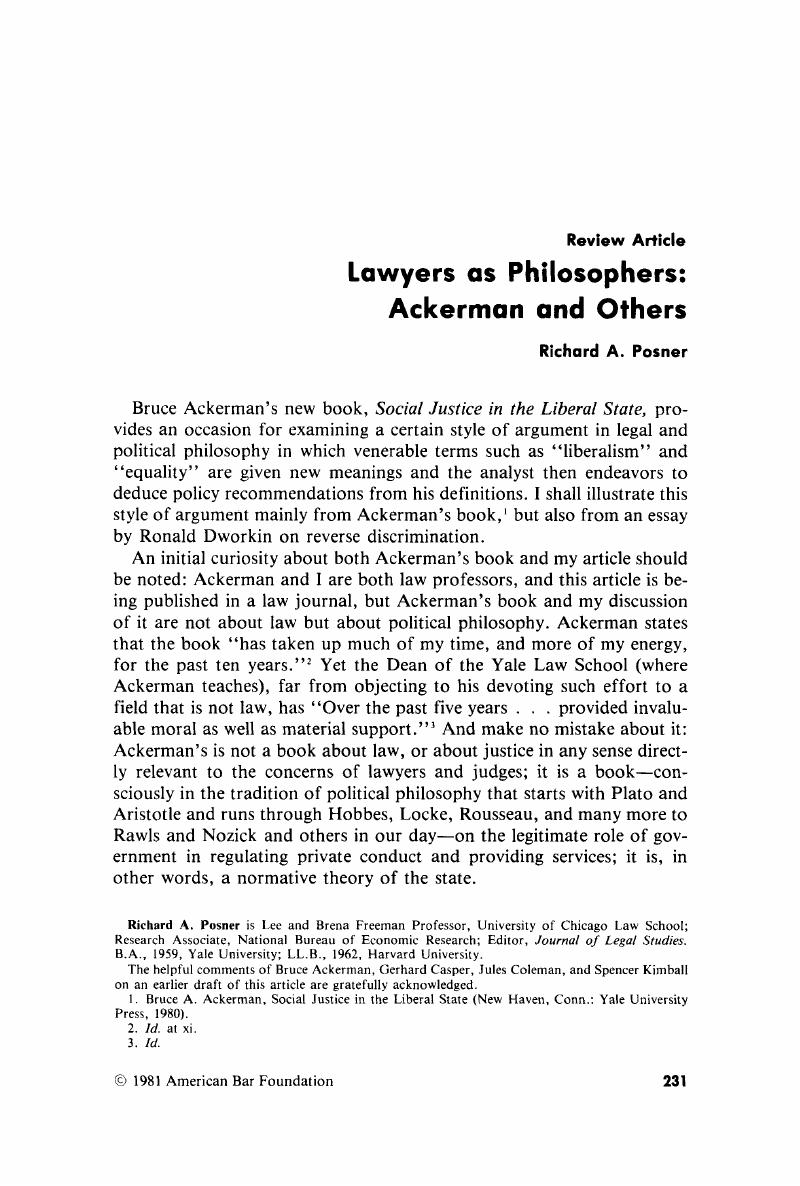No CrossRef data available.
Article contents
Review Article Lawyers as Philosophers: Ackerman and Others
Published online by Cambridge University Press: 20 November 2018
Abstract

- Type
- Review Article
- Information
- Copyright
- Copyright © American Bar Foundation, 1981
References
1 Bruce A. Ackerman, Social Justice in the Liberal State (New Haven, Conn.: Yale University Press, 1980).Google Scholar
2 Id. at xi.Google Scholar
3 Id.Google Scholar
4 See John Rawls, A Theory of Justice (Cambridge, Mass.: Harvard University Press, Belknap Press, 1971); Robert Nozick, Anarchy, State and Utopia (New York: Basic Books, Inc., 1974).Google Scholar
5 See Bruce A. Ackerman, Private Property and the Constitution 190–289 (New Haven, Conn.: Yale University Press, 1977).Google Scholar
6 See, e.g., Ackerman, supra note 1, at 258.Google Scholar
7 Id. at 8.Google Scholar
8 For example, “a liberal relationship is defined as a social condition in which power wielders ask and answer each others' questions of legitimacy.”Id. at 71. “A liberal state is nothing more than a collection of individuals who can participate in a dialogue in which all aspects of their power position may be justified in a certain way.”Id. at 72 (emphasis in original). Thus, liberalism is defined as Ackermanism.Google Scholar
9 Id. at 10, 138.Google Scholar
10 Id. at 161.Google Scholar
11 Id. at 327.Google Scholar
12 Id. at 264.Google Scholar
13 Id. at 11.Google Scholar
14 Id. at 75.Google Scholar
15 Ackerman affirms the right of the individual not to talk about questions of legitimacy, beyond being able to say “‘I should get X because I'm at least as good as you are.’”Id. at 372. But such a statement is not good evidence of “dialogic competence”—it is not necessarily a mature or even rational statement.Google Scholar
16 Id. at 80.Google Scholar
17 See id. at 10–12, 359–69.Google Scholar
18 See id. at 12.Google Scholar
19 Id. at 376.Google Scholar
20 Id. at 4.Google Scholar
21 Id. at 249.Google Scholar
22 See Stigler, George J., Wealth, and Possibly Liberty, 7 J. Legal Stud. 213 (1978).Google Scholar
23 This argument is developed in Posner, Richard A., Utilitarianism, Economics and Legal Theory, 8 J. Legal Stud. 103 (1979); id., The Economics of Justice, ch. 3 (Harvard University Press, forthcoming 1981).CrossRefGoogle Scholar
24 Ackerman, supra note 1, at 58.Google Scholar
25 Id. at 66.Google Scholar
26 See Id. at 361.Google Scholar
27 See id. at 12.Google Scholar
28 Aristotle, Nicomachean Ethics, bk. 5, ch. 3 (new & rev. ed. with English trans, by H. Rack-ham, Cambridge, Mass.: Harvard University Press, 1934).Google Scholar
29 See id., bk. 5, ch. 4, 5.Google Scholar
30 Ackerman, supra note 1, at 247.Google Scholar
31 See id. at 247–48.Google Scholar
32 Id. at 269.Google Scholar
33 See references in note 23 supra.Google Scholar
34 Ackerman, supra note 1, at 311.Google Scholar
35 Id. at 297 (emphasis in original).Google Scholar
36 Id. at 160.Google Scholar
37 Id.Google Scholar
38 Id. at 127.Google Scholar
39 Id. at 129.Google Scholar
40 Id.Google Scholar
41 This possibility vitiates an alternative argument that Ackerman offers against infanticide: that it interferes with the rights of putative adoptive parents. Id. Taken seriously, this would also be an argument against abortion. But Ackerman would in general permit abortion.Google Scholar
42 Id. at 126.Google Scholar
43 See id. at 57.Google Scholar
44 See Posner, Richard A., The Concept of Corrective Justice in Recent Theories of Tort Law (10 J. Legal Stud., Jan. 1981, forthcoming).CrossRefGoogle Scholar
45 Aristotle, supra note 27, at bk. 5, ch. 2, 11. 12–13; ch. 4.Google Scholar
46 Id., at 274–75.Google Scholar
47 See, e.g., Borgo, John, Causal Paradigms in Tort Law, 8 J. Legal Stud. 419 (1979); Epstein, Richard A., Nuisance Law: Corrective Justice and Its Utilitarian Constraints, 8 J. Legal Stud. 49 (1979).Google Scholar
48 See Ronald Dworkin, Taking Rights Seriously, ch. 9 (Cambridge, Mass.: Harvard University Press, 1977).Google Scholar
49 Id. at 226–27.Google Scholar
50 See Bruce Aune, Kant's Theory of Morals 160 (Princeton, N.J.: Princeton University Press, 1979).Google Scholar
51 See Aristotle, supra note 27, at 268–69.Google Scholar
52 Dworkin, supra note 47, at 227 (emphasis in original).Google Scholar
53 Id.Google Scholar
54 Id. (emphasis in original).Google Scholar
55 Id.Google Scholar
56 Dworkin, Ronald M., Is Wealth a Value? 9 J. Legal Stud. 191, 223 n.14 (1980). There is another brief discussion of the right to equal concern and respect in Taking Rights Seriously, but neither the content nor origin of the right is explained, although Rawls is said to have implied such a right. See Dworkin, supra note 47, at 180–83. See also id. at 273, where the right is again briefly discussed.Google Scholar
57 Dworkin, supra note 47, at 238.Google Scholar
58 Id.Google Scholar
59 See, e.g., Phelps, Edmund S., The Statistical Theory of Racism and Sexism, 62 Am. Econ. Rev. 659 (1972).Google Scholar
60 See Coleman, Jules L., Book Review, 66 Calif. L. Rev. 885, 915–18 (1978).Google Scholar
61 See Dworkin, supra note 47, at 234–35, 275.Google Scholar
62 See Posner, The Economics of Justice, supra note 22, ch. 13.Google Scholar
63 Id. at 239.Google Scholar




